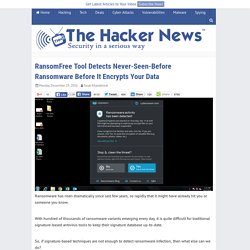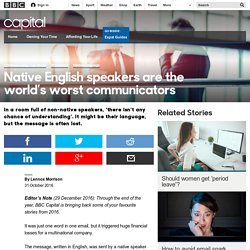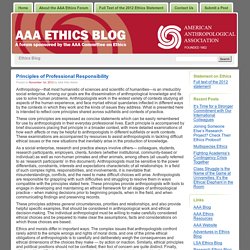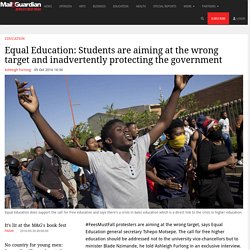

Matteo Maniscalco
RansomFree Tool Detects Never-Seen-Before Ransomware Before It Encrypts Your Data. Ransomware has risen dramatically since last few years, so rapidly that it might have already hit you or someone you know.

With hundred of thousands of ransomware variants emerging every day, it is quite difficult for traditional signature-based antivirus tools to keep their signature database up-to-date. So, if signature-based techniques are not enough to detect ransomware infection, then what else can we do? The solution is RansomFree. Boston-based cyber security firm Cybereason has released RansomFree — a real-time ransomware detection and response software that can spot most strains of Ransomware before it starts encrypting files and alert the user to take action.
RansomFree is a free standalone product and is compatible with PCs running Windows 7, 8 and 10, as well as Windows Server 2010 R2 and 2008 R2. "The ability to detect and stop never-before-seen ransomware is one of the features that makes RansomFree so unique," the company's spokesperson told The Hacker News. Astro Teller, Captain of Moonshots at X, on the Future of AI, Robots, and Coffeemakers. Astro Teller has an unusual way of starting a new project: He tries to kill it.

Teller is the head of X, formerly called Google X, the advanced technology lab of Alphabet. At X’s headquarters not far from the Googleplex in Mountain View, Calif., Teller leads a group of engineers, inventors, and designers devoted to futuristic “moonshot” projects like self-driving cars, delivery drones, and Internet-beaming balloons. To turn their wild ideas into reality, Teller and his team have developed a unique approach. It starts with trying to prove that whatever it is that you’re trying to do can’t be done—in other words, trying to kill your own idea. Videos, articles, and tips to help you succeed, from the world's leading experts. Capital - Native English speakers are the world’s worst communicators. Editor’s Note (29 December 2016): Through the end of the year, BBC Capital is bringing back some of your favourite stories from 2016.

It was just one word in one email, but it triggered huge financial losses for a multinational company. The message, written in English, was sent by a native speaker to a colleague for whom English was a second language. Unsure of the word, the recipient found two contradictory meanings in his dictionary. He acted on the wrong one. Months later, senior management investigated why the project had flopped, costing hundreds of thousands of dollars. Rachel Botsman: We've stopped trusting institutions and started trusting strangers. ZCash Will Be a Truly Anonymous Blockchain-Based Currency.
Replace Lego’s $190 Intelligent Brick with MIT’s Scratch and a $40 Raspberry Pi. This Is What Happens When Muslims and Chinese Martial Arts Come Together. The Ottoman Empire, which was one of the most extensive empires of the world at the 16th and 17th century, has left a very impressive architectural heritage.

Many different nationalities, languages, and cultures came under one reign. These cultures strongly influenced each other in many ways, one of the aspects being the architecture. Ethics Blog » Full Text of the 2012 Ethics Statement. Results of anthropological research should be disseminated in a timely fashion.

It is important to bear in mind that these results may not be clear cut, and may be subject to multiple interpretations, as well as susceptible to differing and unintended uses. In some situations, limitations on dissemination may be appropriate where such restrictions will protect participants or their cultural heritage and/or tangible or intangible cultural or intellectual property. Equal Education: Students are aiming at the wrong target and inadvertently protecting the government. #FeesMustFall protesters are aiming at the wrong target, says Equal Education general secretary Tshepo Motsepe.

The call for free higher education should be addressed not to the university vice-chancellors but to minister Blade Nzimande, he told Ashleigh Furlong in an exclusive interview. Could you describe Equal Education’s submissions to the Fees Commission? First, we stated that we support the call for free education, and second, we stated that the crisis in basic education has a direct link to the crisis in higher education. Out of the 27 universities in the country you only have six top universities, our former white universities. 4 Flaws hit HTTP/2 Protocol that could allow Hackers to Disrupt Servers. If you think that the HTTP/2 protocol is more secure than the standard HTTP (Hypertext Transfer Protocol), then you might be wrong, as it took researchers just four months to discover four flaws in the HTTP/2 protocol.

HTTP/2 was launched properly just in May last year after Google bundled its SPDY project into HTTP/2 in February in an effort to speed up the loading of web pages as well as the browsing experience of the online users. Now, security researchers from data center security vendor Imperva today at Black Hat conference revealed details on at least four high-profile vulnerabilities in HTTP/2 – a major revision of the HTTP network protocol that the today’s web is based on. Press freedom: Worrying signs as South Africa slips in global rankings. On 19 October 1977, the apartheid government in South Africa banned The World, the Weekend World and arrested the newspapers’ editor Percy Qoboza.

Pro Veritate, an ecumenical newspaper, was also banned. The day was named Black Wednesday and is commemorated every year. It serves as an opportunity to take stock of how the country is faring when it comes to press freedom. Since the end of apartheid South Africa has made great advances when it comes to freedom of the press and freedom of expression in general. The situation today is a far cry from the apartheid era. Freedom of expression is firmly embedded in the country’s constitution which provides for the “freedom of press and other media”. Legislation, such as the Promotion of Access to Information Act has been put in place to underpin these constitutional rights.
#FeesMustFall in numbers: This is what the protests have cost South Africa's universities.